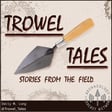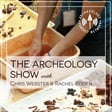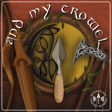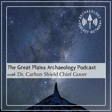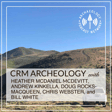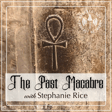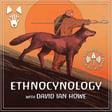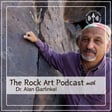Become a Creator today!Start creating today - Share your story with the world!
Start for free
00:00:00
00:00:01

Why We Matter - Episode 6
On this episode of Trowel Tales, we talk about and share stories on why archaeology and archaeologists matter in this day and age, especially with some major political challenges facing the field.
Transcript
Introduction to the Podcast and Sponsor
00:00:01
Speaker
You are listening to the Archaeology Podcast Network. The Archaeology Podcast Network is sponsored by Codify, a California benefit corporation. Visit codify at www.codifi.com.
Emily Long Introduces Episode and Topic
00:00:25
Speaker
Welcome to episode six of the Trial Tales podcast.
00:00:30
Speaker
I'm Emily Long, and on this episode we'll get into how and why archaeology is important in this day and age, especially in the face of some major political challenges facing the field.
Political Challenges to Cultural Resource Management
00:00:43
Speaker
With the new administration, there is a new concentrated effort to diminish cultural resource management laws and the compliance process.
00:00:52
Speaker
But these laws and compliance are crucial in protecting the past. We, as archaeologists, need to continue vocalizing our concerns and getting the word out. And more than that, we need to be better at explaining what archaeology is all about.
The Importance of Archaeology Beyond Media Portrayals
00:01:12
Speaker
Why? Why should you care? Because archaeology matters. And what archaeologists do matters. Unfortunately, it can be hard to describe what it is we actually do and how it is important. The portrayal of archaeology in the media, from Indiana Jones to ancient aliens,
00:01:33
Speaker
doesn't really help our case either. It's not all about gold or finding cool artifacts. Our primary goals are to record and protect the past for future generations. Many of the laws created that protect archaeological sites were established because of public concern over the destruction of historic and prehistoric places.
00:01:56
Speaker
The laws were not created to simply wrap up projects in huge reams of red tape, although it may seem that way. Laws like the Antiquities Act to the National Historic Preservation Act were established to provide a check and balance system to slow down the process and make sure nothing gets inadvertently destroyed.
Essential Laws for Site Protection
00:02:17
Speaker
And these laws demonstrate the inherent value of the past in the present.
00:02:22
Speaker
I asked a couple of archaeologists why they think archaeology and their role as an archaeologist are important. Why does archaeology matter in general? Well, to start with, we'll go with the old adage. You know, those that don't learn their history are doomed to repeat it. And we need to learn not only our history of what's written down, which, you know, another old adage, history is written by the victors.
00:02:49
Speaker
or the oppressors. And archaeology lets us get a better picture of everybody. And there's always, you know, society in general still values history and archaeology. Otherwise, there wouldn't be this heritage
00:03:07
Speaker
industry you know you can go visit Pompeii visit Tikal visit Kuala Lumpur all these places why are we visiting them if they don't have any value and certainly not everything's been found so you know let's get more data on you know ho-ho-com let's get more data on all these places and you know when
00:03:34
Speaker
the global economy is changing because we have more automation and different means of production are going away or coming in. Tourism is one of those things that keeps happening and is really good for an economy. Some places in Central America that I've been, those that recognize that cultural tourism is good financial sense have much better protection
00:04:04
Speaker
and the common everyday person has a better idea about protecting it. They also have a better idea of how much things are worth on the black market. You know, that's your trade off. But they do know, hey, here's this thing, we should protect it. Whether they're gonna sell on the black market or report it. It depends on how healthy the overall economy is and their particular socioeconomic situation. But still, there's a value there.
00:04:34
Speaker
How does your role as an archaeologist matter? Well, I mean, if we want to get in the full medicines of the thing, we're all star stuff, but nothing but a blink of the in the eye of our planet. It will eventually reach homeostasis without us. But as far as, you know, the grand scammer thing for humans, there's always this thing with humans that we got to know.
00:04:58
Speaker
where something came from. There's this zest for knowledge, so much so that it's been, you know, the main idea between the longest running sci-fi series, uh, in the United States, Star Trek, you know, new people, new civilizations. What are we doing? We're not conquering. We're not going to kill things. We're learning.
00:05:25
Speaker
And I don't know why series such as that would go on. If there was a little bit of that in, you know, our personal experience as humans. Oh. Archaeology is just like Star Trek. Katzen Picard is a, you know, archaeologist. No way. Yes, he is. Oh my gosh. Nerd. Nerd.
00:05:52
Speaker
And then more so, I like knowing where I come from. I know other people wanna know where they come from. One of my personal parts of study is contact and undocumented peoples. Who were the people that were getting shat on? Who were the people that were shoved out of the way, who weren't written up in history? These are the things that for me really get my archeology buzz. Oh, this happened.
00:06:21
Speaker
And this culture meant this culture. Ooh, was it diffusion? Was it conquering?
00:06:28
Speaker
Did they marry? Like, how did this happen? What can that tell us about what's going on in the world today? Because, you know, we have our anthropology, we have our ethnography, we can look at all these things, we can pull our sociology. And part of our fulfilled American archaeology is, you know, is cultural, physical, linguistics and archaeology, because you have to get the whole picture by giving someone a history that was taken from them, or even better,
00:06:58
Speaker
allowing them to discover their own history. You know, whenever I've had the opportunity, I've done outreach projects for CRM projects. And also even with my thesis project, which was sort of academic slash CRM, you get the local community involved, you know, people that might be descendants of these people or people that just have no idea where things come from. And there's nothing better than seeing someone be at a child
00:07:28
Speaker
you know, an adult or, you know, somewhere in between. And they realize that they're touching something, that they're finding something out about the people that used to live where they live now, that did the same job that they did now that had, you know, sisters and mothers, you know, children, they had to grow up, they had to go through puberty, they had to watch people be born, people die.
00:07:56
Speaker
And I think it gives everyone just a better understanding of other humans, their own humanity, and how we're all connected. And so I think archaeology is just part of that machination of making society work better together. It can be used for evil as well as it can be used for good. But for me personally, I try and give voice to the voiceless
00:08:25
Speaker
make people learn about other people, care about other people, and I hope that in some small way I help move us in a nicer, lighter direction.
00:08:46
Speaker
This is Chris Webster, founder of the Archaeology Podcast Network. Before I say why my job matters, I want to talk about what I do for archaeology. I'm kind of involved in what I call the trifecta. Well, let me start a little farther back. When I stopped working for other people, I started my own firm back in 2013 called Digtech.
00:09:07
Speaker
The idea behind DigTech was to basically create a place that wasn't just a CRM firm. And in fact, just about a year and a half ago, I created kind of a pie chart where CRM was like 20% of that. Because I really believe that to effectively do archaeology, which is not like a 9 to 5 Monday through Friday job, archaeology is
00:09:26
Speaker
the study of past human cultures and people and their material culture. And that's a pretty serious responsibility. And to do that effectively, we need to be properly trained, we need to properly collect the material and the information in the field, and then we need to tell people about it. So that trifecta has ended up creating several other businesses. One of those is PCS, Professional Certifications for Scientists.
00:09:53
Speaker
PCS aims to increase the level of understanding and knowledge amongst field archaeologists and the public alike, because both need to be trained. The recent Dakota Access Pipeline is pretty solid evidence that people don't really understand Native American cultures and what's going on there. So PCS helps to not only teach people the technical aspects, but more the cultural aspects of things. And then there's the Center for Digital Archaeology, which I didn't start, but I'm a part of, and we're doing webinars and training webinars to teach people similar things.
00:10:23
Speaker
you can't have too many you really can't have too many training outlets out there and Then the second thing I'm involved with that's kind of the middle portion of that the collection in the field is codify you know I've been talking to Michael Ashley who's the founder of codify and You know he's creating this software. We're both you know putting input on it, and it's this
00:10:46
Speaker
It's going to be out here soon and it's just levels up how you collect information in the field. It's not about doing it faster. It's not about just doing it on tablets because we shouldn't be using paper, although that's a pretty good reason in and of itself.
00:11:02
Speaker
recording the archaeology and not trying to fill out a form. You shouldn't have to see a form. You should be thinking about what makes this site important? What makes this site unique? Or what on this site do I need to record? You know, what am I looking at? What do I need to put down? And Codify allows you to do that. It doesn't say, here's a blank, fill it out. You know, here's a space on the form that needs to be filled in, fill that out. No, you look at the archaeology and you do it. So that's kind of leveling up how we think about that.
00:11:29
Speaker
And then finally, the Archaeology Podcast Network. This is the outreach mechanism for a lot of what I do and a lot of what other people do. We have over 20 hosts on the Archaeology Podcast Network, all concerned with providing great material to the public. And not just the public in some of our cases. It's the public and other interested archaeologists that want to learn more, that want to figure out how they too can
00:11:55
Speaker
present the information from their sites to other people. Anyway, that's what I do and that's really why all this matters. Some of my podcasts that I do, like the CRM Archaeology Podcast is really geared towards CRM professionals, cultural resource management professionals. And so instead of talking about a cool site or some sort of thing I found, which there's lots of,
00:12:23
Speaker
I'll talk about an interaction I had actually just a couple months ago. A person sent me an email, and she said that she got out of CRM a few years ago and was working this pretty cushy office job that she liked. Well, she didn't love it, but she liked it. It had good pay, great benefits. She vacationed. I mean, she was living the, quote, American dream. But then she found the CRM archaeology podcast, and that alone tells me something, that she was hungry for archaeology again, right? She just like, she never lost her passion for it, but she just couldn't make a living in it.
00:12:53
Speaker
So, she started listening to the Sierra Marche LG podcast and we constantly tell people, listen, there's no straight arrow career path in this field. There's lots of ways to do things. There's lots of paths you can take. You can leave it for a while and come back to it. You can do whatever you want.
00:13:09
Speaker
And she took that to heart and listened to us for a couple years and then decided to go back to grad school and get back into archeology. So that's the kind of impact that what we do can have on people and the public. And I'd really love to know and to hear if anybody actually got into archeology because of one of our podcasts. Did we encourage people to come in the field? Did we encourage people to stay in the field? I know we've encouraged people to come back and we may have encouraged people to leave too.
00:13:37
Speaker
It's a two-way street. But I think that's what's important about this. And especially in today's political climate, having a great understanding of why we do archaeology, not just so we can build roads and pipelines, but what is the reason the cultural resources mandates exist for us to go out there? You're going to put up a $3 billion pipeline. Why do we have to go out there again and record can scatters and flake scatters?
00:14:07
Speaker
because it's important, because it's going to be destroyed. And if we don't understand that it's important now, it might be important later when someone does a larger analysis on the entire thing. So that's why we do this. We do it for the present, we do it for the past, and I think more importantly, we do it for the future. Archaeology and anthropology as a broader
00:14:34
Speaker
subject are really important because it's about trying to step outside of your own world and into someone else's and trying to understand who they are, where they're coming from, what forces have shaped their lives both personally but shaped a particular society in a way and those skills are so important in creating
00:15:03
Speaker
compassionate, empathetic, understanding individuals and creating citizens of the world. And I think that those skills really can't be oversold. But a lot of what I do is more about public outreach and letting people know what's going on in different parts of the world and what archaeological discoveries have been made or the importance of
00:15:33
Speaker
protecting the archaeological sites that we have and that are currently uncovered that need TLC to continue to exist, but also the importance of protecting sites that we haven't uncovered that are maybe in danger of being lost through global warming, sea level rise, melting glaciers,
00:16:00
Speaker
Unfortunately we live in a time where apparently we're not necessarily believing in climate change and it's the thing and it's impacting our lives and that's a fact, not an alternative fact, just a regular fact. I think we need to recognize and talk about and realize that it's not an opinion, it's scientifically proven. And so it's nice because then archaeology provides an avenue to get people to talk about it.
00:16:26
Speaker
Right. Well, it's interesting. Who doesn't love archaeology? You know, when you start talking about CO2 parts per million in the atmosphere, you might see some eyes glaze over. But, you know, archaeological sites sinking underwater is something that's going to catch a lot more attention and maybe an easier path of engagement.
00:16:51
Speaker
Sometimes it's hard to describe the full scope of archaeology and why it matters to more than a bunch of archaeologists. We certainly can get a whole bunch of glazed over looks when we start talking about sherds and flakes. When working for a federal agency, I've found that archaeologists have the opportunity to wear many different hats and work with a variety of departments and many different kinds of people. I've found it amazing
00:17:18
Speaker
how many different types of tasks we can do for just one job that it all falls into just as part of the job. When I worked for the National Park Service and the Forest Service,
00:17:31
Speaker
I would work with trail crew managers, fire crews, wetlands management, many different groups within just one federal agency and then at just one park. And we would figure out if a trail would affect an archaeological site or if a certain area needed to be protected from wildfire, whether or not it could be burned over. Brings to mind that there was this one meadow restoration project where
00:17:56
Speaker
a whole bunch of ologists, biologists, compliance specialists, archaeologists, etc. We all backed backpacked into a wilderness location that needed metal restoration. It's a massive project and it was a massive undertaking that required everyone to be on the same page.
00:18:14
Speaker
And by working together, we were able to restore a meadow without harming nearby archaeological sites. So that was particularly important to me. And I was able to explain to everybody while there, everyone together, why we couldn't do certain construction in one area, but we could do construction in another area. Same went for the biologists and so on.
00:18:40
Speaker
And there are many examples of this type of, of this kind of project at work at every federal agency. And it shows that that cooperation with cultural resources and other departments, it's absolutely necessary in order to protect prehistoric and historic sites. And I like to think of parks and forests as these huge outdoor museums. And you wouldn't go dropping through a museum knocking over stuff. It's a place that deserves respect.
00:19:09
Speaker
Everything that is part of a park or national forest or Bureau of Land Management on and on and on deserves the same kind of respect. And that respect goes for rock formations, plants, animals, and specifically for what I study, artifacts. And I think that's why my job matters. I can help highlight the things that need protecting and preserving
00:19:33
Speaker
with a host of other specialists. And from there, we're helping protect the things that need protecting. Let's take a quick break.
00:19:52
Speaker
Let's face it, the quality of archaeological field photography could really use some improvement. We aim to change this with the Codify Magic Photo Board. This lightweight but incredibly durable board is designed to help you take color perfect photos of artifacts, features, and sights using almost any camera, even your smartphone. You need to see it to believe it.
00:20:09
Speaker
Engineered from exceptional quality, color-safe, high-pressure laminate, Codify Magic Photoboard is ready for tough field conditions. It's guaranteed to level up your photography. Start taking publication-worthy photos right in the field with the Codify Magic Photoboard. Available now for pre-order, visit codify.com slash APN. That's codify.com forward slash APN today and get your promo code exclusively for listeners of the Archaeology Podcast Network.
00:20:49
Speaker
Welcome back. Let's listen to another archaeologist talk about why he believes archaeology matters and why his role as an archaeologist matters. So to me, archaeology means a lot of things, but the biggest thing that it means to me
00:21:10
Speaker
is the worldview that it's given me. And by that I mean through all that I've done in school and all that I've done in interacting with other people in the workplace, whether they're co-workers, whether they're clients, whether they're just people out in public,
00:21:28
Speaker
on the lands that are being impacted by archaeological study uh... you know it changes the way you look at things and so the the world view that you get from interacting with people and from the social theory that you learn in school you can't just walk away from that it changes you and so you know you you hear a lot of people say it i've heard it on the women in archaeology podcast and it's a hundred percent correct is that
00:21:57
Speaker
archaeology is inherently an activist. It's inherently an activist field of work. And, you know, that's I think that that's what it means, is there's so much wrapped up in it. And you can't take that knowledge in and just like be a passive observer, you know, knowing how very complex factors play in
00:22:24
Speaker
individuals lives and in the functioning of a society and in the creation of their material remains in power dynamics and the relationship with the environment in resource use all of these things are such nuanced ideas that
00:22:44
Speaker
uh you know you you don't really get a deep working knowledge of in many other fields and so archaeology is really special to me because of that and because it gives it gives me a worldview but i know that other people who are practicing archaeology
00:23:02
Speaker
are more often than not on the same page. And because we've all gone through very similar training, even if we've worked in very different parts of the world, you know, we, we adhere to the same codes of ethics, and we adhere to, or not adhere to, but you know, we've, we've had to pull apart complex ideas and put them back together in a working fashion. And, you know, that's,
00:23:31
Speaker
That's what it means to me. And I feel like a lot of archaeologists would agree to that. And that's something that I try to convey to students as well whenever I get to teach students and tell them what it means to me. That's always what I go to. There's a ton of things that it does mean, but I think that's the biggest thing. I have some examples of the archaeological worldview at play.
00:23:57
Speaker
And one of them comes from an annual conference that I help run in North Carolina every year. It's called Maya at the Lago, and it happens in Davidson, North Carolina. So it brings together Maya researchers from all over the world. They tend to be mostly American researchers who work in the Maya area.
00:24:18
Speaker
These are some brilliant minds and North Carolina, this brings together all of the factors at play of archaeology being an activist science and then also us as individuals being activists. North Carolina has been embattled in some political and social controversies over the past couple of years given their
00:24:44
Speaker
their political climate that's, you know, not just very hostile to science, but hostile to a ton of members of their society. It's horrifying to watch and I spent 13 years of my life in living in North Carolina and at one point I called that place home and now I'm ashamed to have ever called it home.
00:25:09
Speaker
You know, even though there are some really special people there and some great, you know, some great cultural contributions that North Carolina has given and it's being erased by these policies. And so, you know, with these policies and all that at the Maya at the Lago to come back to that.
00:25:26
Speaker
This is an archaeological conference that happens every year and there are researchers, there are students, and there are focuses of research that fall into the realm of queer theory and also LGBTQ activism. We have members of the LGBTQ community that are our students, there are professors, there are mentors, there are friends, there are family.
00:25:51
Speaker
Last year, the famous bathroom bill was passed in North Carolina. The conference is hosted in a school. This school is a great school. It builds an inclusive space. But on a matter of principle, some of my friends and mentors reached out to me who are part of the LGBTQ community and they said that they would not be attending the conference that year.
00:26:19
Speaker
uh because of the bathroom bill and that they had you know chosen to personally boycott anything in that state and i completely respected that opinion and i had considered doing it as well and i was in a position though that if i boycotted the conference then it you know it could be pulled off without me but
00:26:43
Speaker
It wouldn't go smoothly and I would be placing a big burden on my friends and colleagues who did go You know to be able to pull this conference off and so, you know out of out of personal responsibility I did go but
00:26:57
Speaker
I decided to make a statement because I gave the opening address and would talk in between presenters. I gave an opening statement that explained the importance of why we were there and the conference itself that year was focusing on queer theory. It was pretty well received.
00:27:18
Speaker
What was amazing about that conference is that everybody was there, like I said, on the same page. That moment there was something that I brought away to my own work. I do the Go Dig a Hole podcast, I've got the Go Dig a Hole blog, and I also teach students every summer in running a field school in Belize.
00:27:39
Speaker
The thing that I took away from that was to really, really focus on building an inclusive archaeology. And that's been like, you know, I've kind of shuffled the deck and put that at the top of my priority stack.
00:27:52
Speaker
As we're talking about why archaeology matters, there's always the question of relevance and there's something that archaeology struggles with, especially for the general public. To be testing out queer theory on non-gender binary, non-heteronormative cultures and then bring that back, it helps us create a more inclusive society because we can think about
00:28:19
Speaker
the social structures at play, and we can think about the kinds of things that impact non-binary members of society. In this current political climate, what can we as archaeologists do to help protect cultural resources and our profession, as well as lend a hand in supporting vulnerable communities? There's this horrifying speed and efficiency at which our government is currently operating,
00:28:47
Speaker
I'm honestly like surprised and amazed every day at the new things that happened, the new laws that are passed, and just like the kind of grandstanding that happens, you know, make people feel unwelcome or intimidated or, you know, push various interests aside. I would say though, what archaeologists need to be ready to do is
00:29:13
Speaker
to find allies in unlikely places. I think a recent example of that for archaeologists was in the fight to save national lands. The unlikely allies were hunters and farmers. Hunters are very interested in conserving the land.
00:29:35
Speaker
I think that in the field, in the practice of archaeology, especially in CRM, I think that a lot of archaeologists might have an adversarial relationship with hunters and farmers because some of us have had guns pointed at us, some of us have even been shot at or just been intimidated or threatened by hunters and farmers because encountering each other in the field is an uncomfortable thing for both people.
00:30:02
Speaker
I think that there's a lot of bridges to be built and a lot of inroads to be made between hunters and farmers and then also other members of the community as well. All of the situations where archaeologists will be engaging with members of the community
00:30:19
Speaker
even if they're not on shift, you know, even if you're just taking a break or out with the crew for dinner, you know, people are going to ask you what you're up to. So anthropologists tend to see eye to eye, but I think most of the public does not see eye to eye with archaeology. And it's not, it's not because
00:30:36
Speaker
They genuinely wish harm upon us or you know, genuinely think what we do is useless or you know, not relevant or practical I think that most people when they really find out what you truly do and that you're out there to preserve things that are important and you're out there to just make sure that the government isn't breaking the law and that developers aren't breaking the law if you're in CRM or if you're
00:31:03
Speaker
you know an academic archaeologist trying to study past cultures and we need allies but we also need to be allies and so it's it's going to be a tough road ahead for archaeologists you know but it's also a tough road ahead for everybody in uh... america right now you know we we're facing some pretty tough times and you know we have to be there as allies for disenfranchised
00:31:32
Speaker
members of society we have to be there as allies for marginalized members of society because we have the toolkits to understand the very nuanced ideas that they're grappling with and the very complex situations that they're finding themselves in and you know maybe they don't have the tools themselves. Let's take a quick break
00:32:02
Speaker
I'm Jessica Equinto and I'm the host of the Heritage Voices podcast. Heritage Voices focuses on how CRM and heritage professionals, public employees, tribes, and descendant communities can best work together to protect their heritage through tribal consultation, collaborative ethnography, and indigenous archeology. Now back to the show. Welcome back.
Promoting Public Support for Antiquities Acts
00:32:34
Speaker
First of all, it's important to, yes, we're archaeologists, but we're also citizens, and to do some of the same things that other citizens are doing, which is call your elected representatives. Go protest if you feel so inclined. Be an actively engaged citizen. Make your opinion heard, but from an archaeological
00:32:59
Speaker
archeologically specific point of view there is information that we have that might not be common knowledge for everyone and talk to your friends about it talk to your neighbors about it talk to the person you're sitting next to on the bus you know as long as they want to talk to you if they're not having it like don't push it but don't be the crazy person on the bus right right we don't we don't need to piss anyone off try and engage the rest of of
00:33:28
Speaker
Because if every archaeologist could get one more person to care about the Antiquities Acts, we've doubled the amount of impact that we've had. And even if each one of those people gets one more person to care, well then we've tripled it. Or even if only half of them get one more person to care.
00:33:51
Speaker
but you can really start a domino effect. It has to start somewhere and it has to start with people who have the information and the expertise. So start there, but also when you, and this is less political engagement and more personal, I almost want to say human engagement, but if you're having a conversation with somebody and
00:34:18
Speaker
You don't understand where they're coming from. Try and put yourself in their shoes. Use the skills that we have all developed as archaeologists and the ability to think about how someone might have lived 2,000 years ago when we have far less contextual clues than we have today to understand where other people are coming from or to help other people understand where you're coming from or where somebody else is coming from.
00:34:46
Speaker
We are a discipline based on trying to understand something we don't understand and make sure that that interest transfers over into our personal lives as well as our professional lives. My first suggestion is my suggestion for no matter the climate, stay informed. Know what's going on in your field. Know what's going on in your country.
00:35:16
Speaker
in regards to your field, what is the current feelings towards your field? What is the worldwide feelings to your field? Would you be able to go to another country in practice? Does your degree transfer? And know what the laws are, what is enforceable, what is not. Find out who are the persons on a local, state, regional, federal level that are involved in those laws, be it enforcing them
00:35:47
Speaker
withdrawing them or just affected by them. A lot of people will complain, you know, about this act, but then you go, Oh, well, you know, but what if it was your grandmother's cemetery or your grandmother's house or something? Just stay informed because knowledge is power for us.
00:36:12
Speaker
99.9% of archaeology jobs in America are based on laws and regulation. So our industry goes away if all the laws go away. Now, there's a lot of laws, laws take a lot of time to withdraw. And moreover, parts of laws are now intertwined. So that, you know, if you're doing this other law, it actually has part of the law you usually go under.
00:36:41
Speaker
mixed in with it or executive order mixed in with it. So yeah, just stay informed, really study the laws, really study the field. What are the requirements? What are the triggers? You know, our industry will either be here alone in a few years, but there's always stuff. You know, anthropologists are valuable, whether we're digging in the dirt or not, because we know people. We study people.
00:37:11
Speaker
And as long as there's people, people need to know about people. I want to say people a few more times. People, people, people, people. I mean, when I graduated with my undergrad, just my undergrad back in the nineties from, you know, a fairly recognizable anthropological program. I got really interesting offers.
00:37:37
Speaker
not necessarily what I would think of as archaeological or anthropological jobs, but things to analyze humans, analyze people, especially why do people do the things they do? How do people move around? How do people justify things in their minds? And I will say, I certainly seriously considered it, but I really wanted to play in the dirt some more. You know, so they're,
00:38:05
Speaker
You know, sometimes you have to expand your idea of what you do. And if you have the resources, you know, and there's places or things that you really think need to be protected, you know, get involved. This weekend, there is a urban black cemetery cleanup and recording going on in town where I live.
00:38:32
Speaker
You know, it's all organized by volunteers. It's 100% volunteer labor, volunteer equipment, but this thing is getting recorded. It's getting cleaned up. It was forgotten and now it's remembered. You know, look for opportunities. Even if it's
00:38:49
Speaker
just talking to kids about how cool history is. I have taught badges for Boy Scouts. There's an archaeology badge. I've done that several times. One of those times I actually had the opportunity to let them excavate a real site as part of a community outreach. Had a Girl Scout in there too.
00:39:11
Speaker
you know, local historical societies love to get a professional archeologist. You can talk about your deekiest site and have a wrapped audience. And that's great because they're the people that are going to find those sites on private property, things that aren't protected by laws, and you can inspire them to protect it.
00:39:35
Speaker
I mean, storytelling is the one thing we can see across all cultures. History and mythology, it all started with oral storytelling. You know, we write it down. What do we write down? Well, that one guy wrote down how many sheep he had that day. Someone else had a collection of all his hate mail. Babylonian with these big clay tablets. It's amazing because he kept shortchanging them on copper dills.
00:40:03
Speaker
He kept every hate mail complaining about his product. And this isn't, you know, finally cabinets. These are clay tablets. When someone found those and recorded them, they didn't just grind them up. And now we can see that these people have always existed. You know, you get someone talking about themselves and then you get them talking about their parents, their grandparents, their ancestors that was on this boat or this village, or, you know, they survived.
00:40:33
Speaker
you know, being removed from their homes. You know, one of my family tells because my family went on the, one branch of my family went on the trail of tears. And there's the family story that gets tracked down how one of my great-greats gave birth in a cave in Tennessee, you know, on the trail. These are gray stories. And they are the story of us. You know, one people, and we're, you know, we're each
00:41:02
Speaker
a different direction, a different ray of light, of viewing it. And again, it comes back to that we tell stories, we give voices, and that's what people are. Humans are storytellers. That's what separates us. What can we do? How can we be proactive?
00:41:24
Speaker
If you're an archaeologist or someone who just loves archaeology, don't be afraid to speak out. Help protect what needs protecting and support groups like indigenous communities and heritage centers that are doing everything in their power to protect the past. We need to listen to those who argue against archaeological laws and try to understand where they're coming from, no matter how frustrating that may be.
00:41:50
Speaker
We want to do that so that we know how to engage and improve our arguments and in our support. We need to talk to everyone about archaeology, to all ages. Interest in archaeology is a great starting point. And from there, we can do a lot of good. Why? Why should you care? Because archaeology matters. Thank you for listening.
00:42:17
Speaker
Special thanks to Deidre, Chris, Chelsea, and another Chris for contributing their time and stories.
Listener Engagement and Feedback
00:42:25
Speaker
Music was provided by Tristan Elliott. Check us out on Facebook to learn more about the podcast and to let us know what kind of stories you'd like to hear.
00:42:34
Speaker
If you're downloading episodes from iTunes, please leave a review. Also, if you're an archaeologist and would like to contribute a tale or two, send a message on Facebook or email at trialtalespodcastatgmail.com. Until next time!
00:42:55
Speaker
This has been a presentation of the Archaeology Podcast Network. Visit us on the web for show notes and other podcasts at www.archaeologypodcastnetwork.com. Contact us at chrisatarchaeologypodcastnetwork.com.
